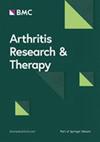Upadacitinib monotherapy versus methotrexate monotherapy in patients with rheumatoid arthritis: efficacy and safety through 5 years in the SELECT-EARLY randomized controlled trial
IF 4.9
2区 医学
Q1 Medicine
引用次数: 0
Abstract
To evaluate the efficacy and safety of upadacitinib monotherapy versus methotrexate (MTX) monotherapy over 5 years among MTX-naïve patients with moderately to severely active rheumatoid arthritis (RA) in the long-term extension (LTE) of the phase 3 SELECT-EARLY trial. Patients were randomized to receive upadacitinib 15 mg or 30 mg or MTX. Patients who did not achieve CDAI remission and had < 20% improvement in tender and swollen joint counts at week 26 received rescue therapy (addition of MTX in the upadacitinib group and addition of upadacitinib in the MTX group). Efficacy assessments were evaluated over 5 years and are reported as observed (AO) for patients who received continuous monotherapy with upadacitinib 15/30 mg or MTX and by randomized group applying non-responder imputation (NRI). Treatment-emergent adverse events (TEAEs) per 100 patient-years were summarized over 5 years. Of 945 patients randomized and treated, 775 (82%) completed week 48 and entered the LTE on study drug. Higher proportions of patients consistently achieved disease activity targets over 5 years with upadacitinib than MTX. In AO analyses, 53%/59% of patients attained CDAI remission with upadacitinib 15/30 mg versus 43% with MTX at week 260. NRI analyses showed better CDAI, DAS28(CRP), and ACR responses with upadacitinib relative to MTX at week 260 (all comparisons, nominal P < .001). Upadacitinib treatment also resulted in numerically greater inhibition of structural joint progression through week 260 compared to MTX. Most TEAEs, serious AEs, and AEs leading to discontinuation were numerically higher in patients receiving upadacitinib 30 mg. Rates of serious infections, herpes zoster, creatine phosphokinase elevation, nonmelanoma skin cancer, and neutropenia were numerically higher with upadacitinib than MTX. The observed safety profile of upadacitinib over 5 years was consistent with earlier trial results and integrated phase 3 safety analyses. Upadacitinib showed better clinical responses versus MTX in patients with RA throughout the 5-year trial. Higher rates of several AEs were observed with upadacitinib, especially in the 30 mg group, compared to MTX. When used as monotherapy in MTX-naïve patients, the approved upadacitinib 15 mg dose showed better long-term efficacy versus MTX and an overall favorable benefit-risk profile. NCT02706873.类风湿性关节炎患者接受奥达替尼单药治疗与甲氨蝶呤单药治疗的对比:SELECT-EARLY 随机对照试验5年的疗效和安全性
目的:在 SELECT-EARLY 试验 3 期的长期扩展(LTE)研究中,评估中度至重度活动性类风湿关节炎(RA)患者在 5 年内接受达达替尼单药治疗与甲氨蝶呤(MTX)单药治疗的疗效和安全性。患者被随机分配接受15毫克或30毫克的upadacitinib或MTX治疗。在第26周未达到CDAI缓解且关节触痛和肿胀计数改善<20%的患者接受了抢救治疗(在upadacitinib组加用MTX,在MTX组加用upadacitinib)。疗效评估的时间跨度为5年,对连续接受奥达替尼15/30毫克或MTX单药治疗的患者按观察结果(AO)进行报告,并按随机分组应用非应答者归因法(NRI)进行报告。对5年内每100例患者年的治疗突发不良事件(TEAEs)进行了总结。在945名接受随机治疗的患者中,有775人(82%)完成了第48周的治疗,并开始服用LTE研究药物。与MTX相比,达帕替尼治疗5年后达到疾病活动性目标的患者比例更高。在AO分析中,53%/59%的患者在第260周时使用达帕替尼15/30毫克达到CDAI缓解,而使用MTX的患者为43%。NRI分析显示,在第260周时,达帕替尼对CDAI、DAS28(CRP)和ACR的反应优于MTX(所有比较,名义P < .001)。与MTX相比,达帕替尼治疗在第260周时对关节结构进展的抑制作用也更大。接受高达替尼 30 毫克治疗的患者中,大多数 TEAEs、严重 AEs 和导致停药的 AEs 在数量上更高。严重感染、带状疱疹、肌酸磷酸激酶升高、非黑色素瘤皮肤癌和中性粒细胞减少症的发生率在数量上高于MTX。观察到的奥达替尼5年来的安全性与早期试验结果和3期综合安全性分析结果一致。在为期5年的试验中,与MTX相比,奥达替尼对RA患者的临床反应更好。与MTX相比,奥达替尼的几种AEs发生率更高,尤其是在30毫克组。在MTX无效的患者中作为单药治疗时,已批准的达达替尼15毫克剂量与MTX相比显示出更好的长期疗效,而且总体获益-风险状况良好。NCT02706873。
本文章由计算机程序翻译,如有差异,请以英文原文为准。
求助全文
约1分钟内获得全文
求助全文
来源期刊

Arthritis Research & Therapy
RHEUMATOLOGY-
CiteScore
8.60
自引率
2.00%
发文量
261
审稿时长
14 weeks
期刊介绍:
Established in 1999, Arthritis Research and Therapy is an international, open access, peer-reviewed journal, publishing original articles in the area of musculoskeletal research and therapy as well as, reviews, commentaries and reports. A major focus of the journal is on the immunologic processes leading to inflammation, damage and repair as they relate to autoimmune rheumatic and musculoskeletal conditions, and which inform the translation of this knowledge into advances in clinical care. Original basic, translational and clinical research is considered for publication along with results of early and late phase therapeutic trials, especially as they pertain to the underpinning science that informs clinical observations in interventional studies.
 求助内容:
求助内容: 应助结果提醒方式:
应助结果提醒方式:


